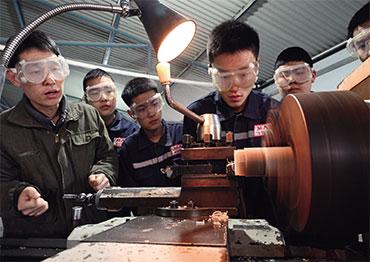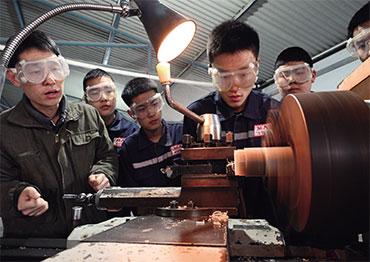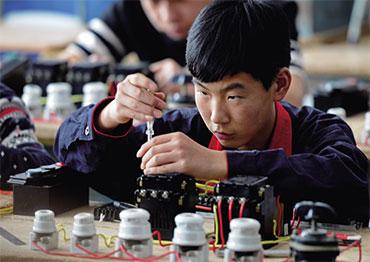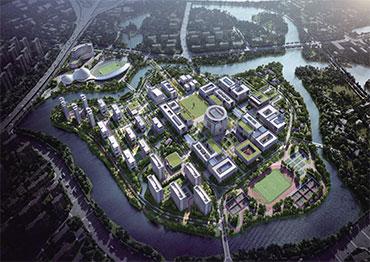Since Cao proposed his university, the school has attracted nationwide attention. Although neither Cao nor the Fuzhou government has defined Fuyao University as a vocational school, many analysts expect it to be a pioneer in vocational education, given its high emphasis on enterprise demands.
Since 1985, China has repeatedly stated its policy of enrolling a proper rate of students in vocational schools after they complete junior high school, which comes at the end of the nine-year period of free compulsory education. But since universities started expanding in the 1990s, the ratio of vocational high school students to high school students has constantly fallen. Vocational high schools have lost their social status and find it hard to recruit good students and teachers. Vocational colleges are in the same predicament. Given they usually recruit students based on the same national examinations as universities, they are considered a safe choice for students not eligible for universities.
But as the number of university graduates grows, it is increasingly hard to find a decent job. According to a 2020 survey on the difficulty graduates have finding employment conducted by a research team led by the Development Research Center of the State Council, among all university graduates and postgraduates who had not signed an employment contract by June 2020, 65.6 percent only had a first degree, nearly 40 percent higher than junior college graduates, eight times that of those with a master’s and 470 times that of PhDs. Meanwhile, businesses complained it was difficult to recruit good workers or technicians. The Ministry of Education (MoE) has emphasized the need to keep a suitable ratio of vocational high school students, pledging to improve vocational schools and enhance their social status.
This did little to ease parents’ worries that their children would have to attend a vocational school after completing junior high school, since parents persistently view vocational schools, especially vocational high schools, as a repository for badly behaved students, low-quality teachers and poor management and teaching.
During the 2022 two sessions, China’s main annual legislative meetings, Feng Yi, a delegate to the National People’s Congress, China’s highest legislature, proposed adding high school education to the compulsory education system of nine years to improve the quality of the workforce.
Other delegates proposed students should not be streamed into regular high schools and vocational schools through national high school entrance exams. The delegates believe that rather than starting work in factories or other enterprises at a young age, students should receive more regular and standardized education.
But at a press conference during the two sessions, MoE official Chen Ziji emphasized the necessity of this separation, saying vocational education is an important part of high school education which enables students of different potential to find a development path that suits them, and it helps promote employment and regional economies. Chen said the MoE is setting up a system for a national entrance exam specially targeting vocational high school students to help them access further education. According to Chen, the MoE will continue to improve vocational colleges and universities and encourage them to expand recruitment based on this exam.
In 2019, the MoE approved 15 vocational colleges to be upgraded to universities and by 2021, at least 22 vocational colleges had become universities. Also in 2019, the MoE issued a document on reforming vocational education, which said that vocational education is of equal importance to regular high school education.
Against this backdrop, Fuyao Technology University could provide an alternative path for vocational education, but it faces challenges in introducing its new model of higher education due to the entrenched university system. It will need firm support from education authorities, analysts said.
“The biggest challenge is whether or not we can really be pioneering and how much room there is for us to make these changes,” Zhu said.
“Enjoying more freedom is a fundamental guarantee of realizing and keeping Fuyao University’s features and the relationship between the school and the government will determine the degree of freedom,” Yan told NewsChina.
When Fuyao Technology University was first put on the agenda of Heren Charity Foundation in May 2021, it was defined as “a public university that explores new operation modes” in an article published on the charity’s WeChat account.
In another article published in November 2021, Heren Charity Foundation redefined Fuyao Technology University as a “new private and non-profit high-end university focusing on technological application and research.” Analysts believe the change in mission statement indicates a greater degree of operational freedom.
“Seen from historical policies, promoting integration of vocational education and ordinary higher education is a major part of industryeducation integration, and private schools are expected to be the biggest implementer of such integration,” commented a report by Industrial Equality cited by stcn.com, an industrial news website.
Chinese media reported that Fuyao Technology University has received significant backing from Fujian provincial government, which has provided 0.8 square kilometers of land and 10 billion yuan (US$1.5b) in capital.
The municipal government of Fuzhou has promised to allocate 300-500 million yuan (US$46.2-76.9m) annually to bring in skilled professionals from overseas. The institution is mentioned often in provincial and municipal government documents on education or city development, making analysts optimistic about the project and its impact on education reform.
“If China continues to pursue reform and opening-up and deals with the relationship between the government, markets and society well, more and more social organizations and individuals will be encouraged to promote educational reform and private education will develop better,” Yan said. “But there might also be external factors that influence the effect of university reform, so it will still be a long time before we see clear changes [in private education],” he added.

 Old Version
Old Version


